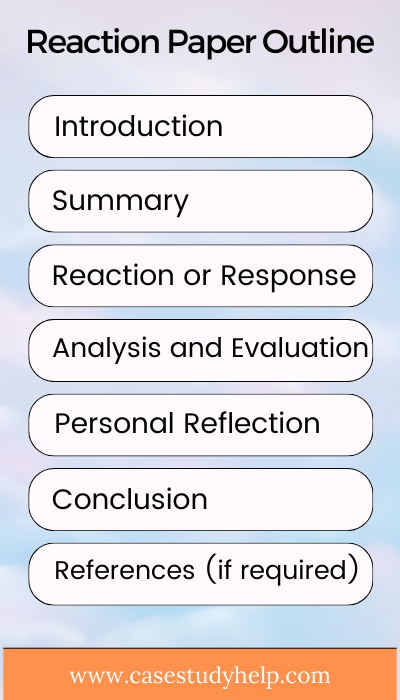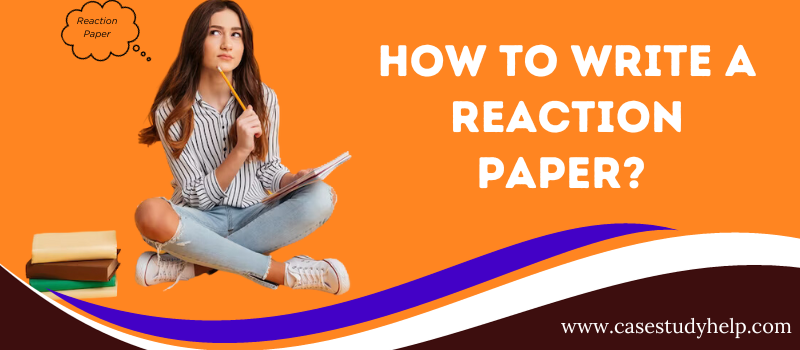What is a Reaction Paper? Consider the Following Factors
A reaction paper ideally includes all the instructions that are found in any academic syllabus. Here, the students need to pay proper attention to the grammar, citation and structure. Always ensure that you understand all the requirements for advising in writing in Chicago style rather than APA style.
Writing a Reaction Paper:
In order to write any reaction paper, it is essential to begin the task with a very open mind. You also need to engage very actively with the material to articulate your own thoughts very clearly with your feelings.
A reaction paper always needs you to remain focused on personal opinions. This makes an easy task for you as compared to the other types of academic assignments. Thus, you always need to master its structure and essence.
Need Help with Assignments and Case Study Writing?
Casestudyhelp.com is the right place that can help you.
Helpful Tips to Write a Perfect Reaction Paper
- Understanding the point in a reaction paper: You can always write better if you share your own opinion. Always ensure that you know the ultimate goal of your reaction paper. Thus, you always need to provide your perspective with a balanced and valuable analysis.
The ultimate goal of your response paper is to develop your own critical thinking skills. An author does not only react to the text but also analyzes the weaknesses and strengths relevant to the text. Here are your thoughts and intentions for accomplishing your objectives.
If you understand the point of your reaction paper, it will help you ensure that you can remain within the scope of your assignment and do not include irrelevant content. This allows you to focus your own response to the significant aspects of the text for presenting your personal opinion clearly and rationally.
- Read the text very carefully after being assigned: Your assignment always asks for your immediate reaction rather than for the immediate one. Your very first thoughts always tend to be ambiguous, biased, or even wrong sometimes. Here, it would help if you had a specific time to make your final opinion about the whole thing. Start studying the material immediately after you are assigned to write the response. Give yourself enough time for all the thoughtful considerations. You also need to reread and research the whole content until you understand it crystal clear. You need to write notes and balance your own perspective. Always make sure that you develop a powerful reaction statement that is very thoughtful. Gather all the necessary information supporting your own argument and also structure them very well. Your writing needs to look more like a review and less like a comment. This is your Reaction Paper Guide.
- Jot down a note of your first reaction: As per the Reaction Paper Guide, it is always essential to jot down notes of your earliest reactions. This helps you to capture your first thoughts and emotions on the given topic. These first responses are often the most honest presentation of your own feelings and always provide a precious insight into your perspective.
Noting down the first reactions can also aid you in organizing your thoughts and identifying critical points you need to explore in your assignment paper. Write down your own thoughts and feelings as you navigate into the subject more and see your ideas progress. It also helps you in grounding the text in your personal experiences and clarifying the thesis. Your assessors desire an authentic and meaningful reflection of your ideas.
Suppose you know how any piece of art makes you feel and why it is essential for the writing process. If you keep track of the personal reactions, it will help you identify the biases. If you examine your own preferences, you can understand your writing perspective and write a more organized assignment paper. It also allows you to identify the parts where you need more research.
- Setting a Perspective: A perspective is actually a viewpoint that guides your analyses and provides a structure for your response paper. Selecting any view always ensures that your essay is more focused and organized with insightful thoughts.
In order to write a Reaction Paper, you need to consider different perspectives on looking into the topic and select the ones most closely related to your heart. Here, it would help if you felt your strengths and weaknesses from your perspective.
Getting into the author’s shoes is always an exciting idea. It would help if you always thought about the motive behind the writing and why the author structured it the way he did with his own objective. This allows you to see things more clearly and use your own analytical skills for drafting a perfect reaction assignment paper for your college or university. This is an essential tip to write a Reaction Paper.
- Defining the Thesis: A thesis statement is actually a roadmap for the remaining paper and helps you guide the reader via the analysis. Defining your view is very important since it provides an obvious as well as concise picture of the basic idea of the response of the paper. It also helps you stay on track with the address of the article.
Defining a thesis statement can be a challenging work of writing the response paper. It would help if you started by gathering all the necessary ideas and the major points. Here, you need to identify the notion which is the most appealing. Here, it would help if you considered its strengths and shortcomings and how relevant it is to the main idea.
- Writing the Final Version: The 1st draft is not enough. It needs a lot of trials to get a good reaction essay. The final version needs to have a solid thesis and needs to be polished and well-structured. You always need to double-check your final version in order to ensure it meets all the needs and expectations of your readers. Read your response paper multiple times to ensure you have an apparent perspective. Always look for the mistakes, and if you find one, restructure it correctly.
- Editing and Proofreading: Always check your spelling and grammar. Thus, you need to do extensive editing and proofreading of your entire reaction paper and edit it likewise to make it flawless.
“Unlock Your Thoughts! Write an Argumentative Essay Paper Today”
READ BLOG: HOW TO WRITE FINEST ARGUMENTATIVE ESSAY WRITING?
Consider the Following Factors
- Organize your sections: Gather the gathered thoughts and structure them likewise. The reaction papers which are not appropriately organised do not attract the reader’s attention. You always need to maintain a constant flow while writing the essay.
Reaction Papers Format & Structure
- Reaction Paper outline: A reaction paper outline always helps you in structuring your response essay flow. It includes an introduction, body parts and a conclusion. Each of these sections serves its own purpose. Each of these units needs to meet the basic standard of any assignment. These are to be written in APA format.
- Organizing the sections: Here, you need to gather all the scattered and structure them.
- Select a proper perspective: A perspective is an appropriate viewpoint for your essay.
- Polish and repeat: You may need to produce 2, 3 or even 4 drafts before the final writing piece. For each of them, pass across your paper during the editing work and focus on the editing process. Ex, if the 1st pass is focused on grammar, spelling and punctuation, the next pass can be looking at the main ideas and so on. As many as passes can be written as per the needs of your writing.
A proper Reaction Papers Format is to be followed in this way.

Reaction Paper Outline
A reaction paper is a critical essay that reflects your thoughts and feelings about a particular subject, such as a book, movie, article, or event. When structuring a reaction paper, consider the following outline:
- Introduction– Briefly introduce the subject or material you’re reacting to. – Provide essential background information. – Clearly state your thesis or the main point of your reaction.
- Summary– Provide a concise summary of the material. Highlight the key points or events without giving too many details. – Remember to avoid including your opinions in this section; focus on factual information.
- Reaction or Response– Express your thoughts, feelings, and opinions regarding the subject matter. – Discuss your immediate reaction or emotional response to the material. – Analyze the material’s impact on you, explaining what resonated or didn’t resonate and why.
- Analysis and Evaluation– Critically evaluate the strengths and weaknesses of the material. – Provide supporting evidence or examples to back up your claims. – Discuss the effectiveness of the author’s arguments or the director’s execution if it’s a film. – Consider the broader implications or relevance of the subject matter.
- Personal Reflection– Reflect on how the subject matter relates to your personal experiences, beliefs, or values. – Discuss any lessons learned or changes in your perspective due to the material.
- Conclusion– Summarize your main points without introducing new information. – Restate your thesis or primary reaction to the material. – Provide a closing thought or call to action if appropriate.
- References (if required)– List any sources you’ve used for the paper, following the appropriate citation style.
Remember that while this outline provides a comprehensive structure, the depth and length of each section might vary based on the specific requirements of your assignment and your personal insights on the material. Adjust the outline to fit the scope and nature of your reaction paper.
The Important Factors on How to Write a Reaction Paper to an Article
- Read and analyze the work very well
- Draft your thesis statement
- Polish and repeat
- Make a proper outline
- Compose the first draft
- Write a good introduction and summary
- Write about your own thoughts, feelings and opinions
- Give a proper conclusion
List of Interesting Reaction Paper Topics for Everyone
- Ray Bradbury’s Dandelion Wine
- My take on George Orwell’s “1984.”
- Ralph Ellison’s “The Invisible Man.”
- William Shakespeare’s “King Lear.”
- “Winnie the Pooh” by Alan Milne.
- “Democracy in America” by Tocqueville.
- What I think of The Sound and the Fury.
- What did I like about “The Stranger”?
- “Native Son” by Richard Wright.
- “Winnie the Pooh” by Alan Milne.
These Reaction Paper Topics are very commonly written by students worldwide.
Final Words
Thus, writing an ideal response paper is not an easy job. You always need the help of the top online reaction paper writing service expert. Casestudyhelp.com is always the top choice for you in this regard.
Why Casestudyhelp.com?
- We are always the top online reaction paper assignment writing service provided
- We will provide you with the best Reaction Paper Example
- The online college Reaction Paper Assignment help service assures you of the top grades
- Our Reaction Paper Essay is free of any plagiarism and errors
- 247 hours of online support and services are available on our website
- Only customized services are provided by our team as per the needs of your college or university.
All clients across the world are very much satisfied and apply for our services.
Author Bio:
Hi, I am Louis Hill, a blog content writer for CaseStudyHelp. I am a well-experienced academic writer. We’ll help make your writing shine.
 How Many Pages are 500 Words?
How Many Pages are 500 Words?
 How Many Pages Is 1500 Words?
How Many Pages Is 1500 Words?
 How Many Pages Is 2000 Words?
How Many Pages Is 2000 Words?
 How to Make Your Assignment Look Presentable?
How to Make Your Assignment Look Presentable?
 7 Useful Tips on How to Write a Short Essay
7 Useful Tips on How to Write a Short Essay


